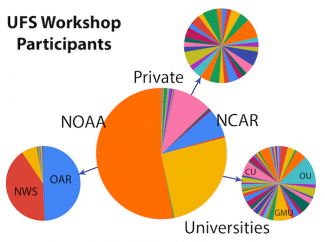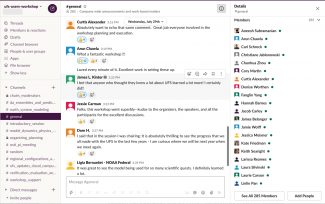The first Unified Forecast System (UFS) Users’ Workshop, held on 27-29 July 2020, convened a broad cross-section of the community, despite transitioning from the originally planned in-person format to a virtual format. Organized by a diverse committee from NOAA Global Systems Laboratory (GSL), NOAA Physical Science Laboratory (PSL), NOAA Environmental Modeling Center (EMC), NOAA National Weather Service (NWS), the National Center for Atmospheric Research (NCAR), and George Mason University, the workshop presenters gave one hundred and ten talks to nearly five hundred attendees who registered for the event. While NOAA had a strong presence at the workshop, over 46% of the participants were not affiliated with NOAA, with a strong showing from the academic community (approximately 25%) representing over 44 different academic institutions. The private sector was the third largest contingent comprising almost 10% of the registrants. NOAA participants were almost equally split between the NWS and NOAA Research. The participants and presenters also represented diverse expertise spanning weather, climate, hydrology, oceanography, space weather, modeling and High Performance Computing.
The workshop kicked off with introductory remarks from Dr. Neil Jacobs, the Assistant Secretary of Commerce for Environmental Observation and Prediction, and an overview of the UFS was presented by the co-leads of the UFS Steering Committee, Dr. Ricky Rood of the University of Michigan and Dr. Hendrik Tolman, the NWS Senior Advisor for Advanced Modeling Systems. The introductory session was rounded out by presentations by the leads for the six UFS application teams: Medium-Range Weather (MRW) and Subseasonal-to-Seasonal (S2S), Short-Range Weather (SRW), Hurricane, Space Weather, Coastal, and Air Quality. The remainder of the workshop was a mix of plenary and parallel sessions focused on six topic areas:
- UFS Updates, Cloud Computing, Infrastructure, and Computational Performance
- Model Dynamics, Physics, and Air Quality
- Data Assimilation, Ensembles, and Predictability
- Regional Configurations and Extremes: Development and Applications
- Verification, Evaluation, and Post Processing
- Earth-System Modeling (Land/Hydrology, Ocean, Sea Ice, Space Weather, Cryosphere)
The participants of the first UFS Users’ Workshop enjoyed lively engagement and discussions, despite the virtual format. To facilitate exchanges that would normally take place over coffee breaks, lunch, or a reception, the organizing committee set up Slack channels where workshop participants were encouraged to post their questions and comments to the speakers, and dialogue was encouraged to continue on this platform following each presentation. Each general topic area was issued a Slack channel to aid in navigating this communication forum and foster dialogue during the parallel sessions.
Find Out More About UFS
- Browse the UFS Portal
- Read the first UFS Quarterly Newsletter
- Subscribe to UFS announcements


